|
Archcliffe
Bulwark Hill
Archcliffe Road
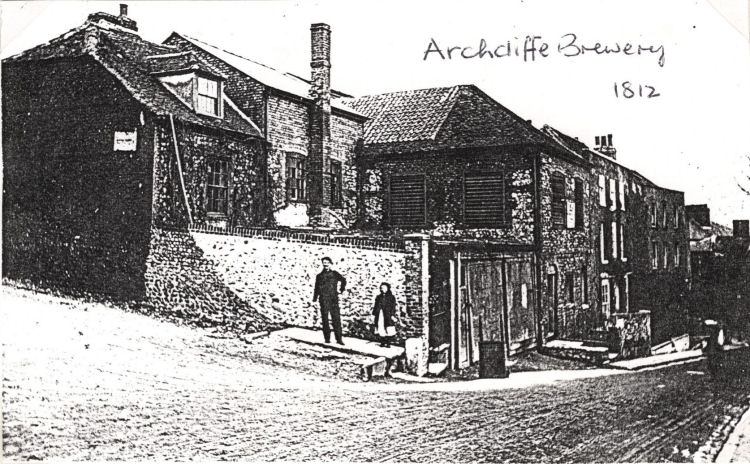 |
|
The above picture states that the photograph was taken in 1812, but
that is an error; the first permanent photograph wasn't invented till
1826. The correct date is 1912, although this may be the year the
brewery was started.
The same better photograph is shown below, but I'm leaving the above
here also as it shows a little bit more of the brewery in the picture.
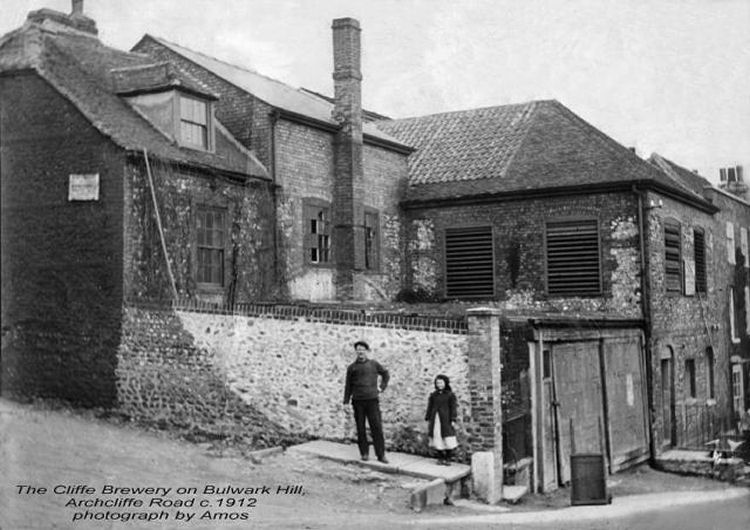 |
Pigot's directory 1823 lists Edward Kingsford as owning this brewery at
that time and the 1824 Pigot's Directory mentions Edward Kingsford again at
"Arch Cliff Fort" as the address. But Pigot's 1828-9 mentions Alfred Kingsford running a brewery at
Archliffe Fort.
Pigot's Directory of 1840 lists a John Alexander Walker and Son at
Bulwark Hill. I wonder whether they were relations of James and Thomas
Walker at Dolphin Lane?
Bagshaw's directory of 1847 mentions a Henry F Cliffe at Bulwark Hill. I
am unsure whether the brewery was named after this gentleman or from the
place name of Archcliffe.
|
From an email received 22 December 2012.
Paul Isles
points out that perhaps the Bagshaw's directory may be wrong here in
naming the man as Henry F Cliffe, and perhaps the name should be Henry
Winch of the Cliffe Brewery, and included with the email the following
passage regarding the death of Goodricke Armstrong Fisher.
From the London Gazette November 18, 1881
GOODRICKE ARMSTRONG FISHER, Deceased.
Pursuant to the Act of Parliament 22 and 23 Viet., c. 3d,intituled
"An Act to further amend the Law of Property, and to relieve Trustees."
*NOTICE is hereby given, that all creditors and other persons having any
claims or demands against or upon the estate of Goodricke Armstrong
Fisher, late of Hillersdon House, Godwyne Road, Dover, in the county of
Kent, a Lieutenant-General of the Bengal Staff Corps, deceased (who died
on the 23rd day of August, 1881, and whose will was proved by
Henry
Winch, of the parish of Shepherdswell, in the said county of Kent, and
of Bulwark Hill Brewery, Dover aforesaid, Brewer, the executor therein
named, in the District Registry at Canterbury of the Probate Division of
Her Majesty's High Court of Justice on the 8th day of November, 1881),
are hereby required to send the particulars of such claims or demands to
the said executor, at the office of his Solicitor, Mr. Thomas Lewis,
situate at No. 7, Castle-street, Dover aforesaid, on or before the 15th
day of January,1882, after which date the said executor will proceed to
distribute the assets of the said deceased among the parties entitled
thereto, having regard only to the claims or demands of which the said
executor shall then have had notice; and the said executor will not
afterwards be liable for the assets, or any part thereof, so distributed
to any person or persons of whose claim or demand he shall not then have
had notice. And all persons indebted to the estate of the said Goodricke
Armstrong Fisher, deceased, are hereby required to pay the amount of
their respective debts to the said executor forth-with.
Dated this 15th day of November, 1881.
THOMAS LEWIS, 7, Castle-street,
Dover, Solicitor for the said Executor.
Further research and the
finding of the following newspaper passage seems to suggest that Henry
Winch is indeed a different person than Henry Cliff of this brewery, and
only worked for them as brewer. Paul Skelton.
|
|
From the Dover Telegraph and Cinque Ports General Advertiser, Saturday, 4 December, 1847. Price 5d.
BULWARK HILL BREWERY, DOVER
HENRY F. CLIFFE having enlarged and reconstructed upon improved
principles the Plant of this Old-established BREWERY, he can now with
confidence solicit a fair trade of the article produced. PALE ALE brewed
as for Exportation; and also light, clean, table Ale for Private
Families.
|
|
From the Dover Express and East Kent News, Friday 22 April, 1887. 1d.
SUICIDE OF A DOVER BREWER
The quaint and picturesque hamlet of Shepherdswell has unfortunately
been the scene of what appears to be a most premeditated act of self
destruction. It would seem that the early hours of Saturday morning last
Mr. Henry Winch, who for many years has been connected with the brewery
of Messrs. Cliff and Co., Bulwark Hill, Dover, took his life by jumping
down a well, 350 ft. deep and situated close to his residence. Mr.
Winch, who had shown symptoms of suicidal mania, was much respected both
at Shepherdswell and at Dover. On the morning in question he succeeded
in eluding the attention of Mr. Smith who was nursing him, and got into
the garden by the dining room window, and passing out into the road went
to the parish well, which is close by, and fell down it. Mr. Smith, who,
having been awake the whole of the night, and hat at the time dozed off,
went at once aroused by a shriek. He immediately proceeded to the well,
and found that the unfortunate gentleman had committed suicide. A man
named Bean, of Eythorne, courageously descended the well, and after
being there about half an hour succeeded in securing the body to a rope,
by which means it was ultimately brought to the surface. An examination
of the body by a medical gentleman proved that deceased was dead.
An inquest will be held on the body, at the Parish Schoolroom,
Shepherdswell, by the County Coroner (R. M. Mercer, Esq.), on Monday
afternoon.
The following were on the Jury:- Mr. Baldwin (foreman), Messrs. F. King,
A. Friend, C. Coppen, H. Coppen, H. P. Stone, H. Penfold, T. Minter, A.
F. Norris, R. H. Burgess, T. Smith, F. Ayers, and H. Baynes.
Mr. Worsfold Mowll attended on behalf of the relations, and Mr. C. K.
Worsfold and Mr. Thomas Lewis were also present.
After the body had been viewed the following evidence was taken:-
John Smith said: I live at Spencer Mount, Priory Hill, Dover, and I am a
general agent. I have been attending the deceased since march 10th, and
my instructions were to attend on him personally. He had given evidence
at times of insanity. My services were employed to watch over him. Dr.
Dixon saw him from time to time as late as Thursday and Friday last.
Since the 10th of March I have resided in the same house as deceased and
slept in the same room. I have also accompanied him when he left the
house. I might let him go alone; I had no instructions to always follow
him. I last saw him alive at 4.50 on the morning of the 16th inst. He
was then asleep. I had been sitting up with him the whole of the night.
In then laid myself down and dozed off for a few minutes, and then heard
a scream. I jumped up and ran downstairs. I heard someone say, “Mr.
Winch has gone.” On looking into the dining room I saw the sash was up
and the flowers had been removed. I went out and saw two men standing by
the well. They said deceased had put himself down the well and that a
woman had told them so. I think this was about 5.15 a.m. The deceased
was only in his night shirt. I was present when the man Bean went down
the well. I saw him come up, and afterwards the deceased was brought up.
I identified the body as that of Henry Winch, of Shepherdswell, brewer,
and he was 51 years of age. At times he had fits of depression and
suicidal mania. That was known to his medical attendants and also to
myself. He was quite capable of transacting business save when these
fits were on him. He had transacted business since I had been there on
several occasions. The previous evening he had left his room and gone
out with only his night shirt on. I had to use force to get him back. I
had never seen him go near the well.
The Jury returned a verdict to the effect that the deceased had
committed suicide by throwing himself down a well, being then insane.
|
|
From the Dover Express and East Kent News, Friday, 27 May, 1887. Price 1d.
SALE OF A BREWERY
The well-known Bulwark Brewery, which has been established something
like forty years, and was formerly carried on by Messrs. H. F. Cliffe
and Co., has been recently purchased by Mr. J. Augustus Rolls, late of
Messrs. Nicholson and Sons, the Brewery, Maidenhead.
|
|
From the Dover Express and East Kent News, Friday 26 August, 1887. 1d.
FIRE AT BULWARK HILL BREWERY
On Tuesday night about eleven o'clock a fire broke out in the back
portion of Bulwark Hill Brewery, the property of Mr. J. Augustus. Rolls. The
premises are old, consequently the fire soon got a hold, but the alarm
having been quickly conveyed to the Police Station by the telephone, the
hose reel was soon on the spot, and a party of soldiers with
considerable energy dragged down the fire escape, but happily that was
not needed. The fire was rather difficult to get at, and the attempt was
first made from the road, but soon a better way was found, by taking the
hose through Mr. Fuller's House, and playing on the fire effectively
from the rear. Fortunately there was not much wind or the adjoining
houses would certainly have caught in the conflagration.
Superintendent Sanders was on the spot, and was very energetic in
directing the operations of the firemen. Amongst those present were,
Councillor Peake, Colonel Court, Mr. Hambrook, Mr. Sergeant, the Curate
of Holy Trinity and Mr. Everett, school-master. The Military were also
on the spot in force, for across the road was said to be a powder
magazine which might have ignited, if the fire had become unmanageable,
and then something serious would have happened. As it was the fire was
soon got under, and in an hour from the time of the alarm was given, it
was practically extinguished. The occupant of the houses each side were
in great terror and began to move their furniture , but the fire did not
touch the houses. Looking at the brewery now, from Bulwark Hill there is
no effects of the fire to be seen, except that a small part of the roof
is gone, but looking at the back, it appears to be a complete wreck, and
much damage seen to have been done to the stock and utensils of trade as
well as to the building. We hear that the whole is insured by the
Guardian Insurance Company.
|
|
From the Dover Express and East Kent News, Friday 2 September, 1887. 1d.
DOVER LICENSING SESSIONS
BULWARK HILL BREWERY
An application was made by Mr. W. C. Hume-Williams on behalf of Mr. J.
A. Rolls the proprietor of Bulwark Hill Brewery for an additional
license to allow him to sell lesser quantities than two dozen bottles of
ale, to be drunk off the premises.
Mr. Martyn Mowll and Mr. Woolaston Knocker both appeared to oppose the
license.
In reply to a question Mr. Lewis said he did not oppose in this case.
Mr. Stilwell, (Clerk to the Magistrates): I thought that you were a
general obstructionist.
Mr. Lewis: I think that is an observation which should not have been
made by a person in your position.
Mr. Stillwell: Surely I might make a joke?
Mr. Lewis: I do not regard it as a joke.
Mr. Stillwell: Perhaps you will sit down.
Mr. Lewis: I shall not sit down. I think you should withdraw that
observation.
Mr. Stillwell: I shall do nothing of the sort.
Mr. Lewis: Then I must appeal to the Magistrates.
The Chairman, (Dr. Astley): I think Mr. Lewis should have taken it in
the spirit in which it was given, and accept it as a laugh.
Mr. Lewis: I accept that from you sir.
Mr. J. A. Rolls was then called to state the facts of the case. He said
in reply to Mr. Mowll, that there were a good number of public houses
within 400 feet of the Brewery but he did not consider that they
affected the case as his customers did not like to go to the public
houses to buy bottled beer. In reply to Mr. Knocker, Mr. Rolls said that
there was a cottage on the brewery premises.
Mr. Mowll opposed on behalf of the Buckland Brewery Company and also on
behalf of the Licensed Victuallers Association.
Mr. Knocker opposed on behalf of the owner of “Archliffe Fort Inn” and
he contended that with that cottage on the premises, this license might
hereafter be used to carry on a regular jug trade, for which there was
no necessity as the neighbourhood had not increased.
The Bench refused the license.
|
|
From the Dover Express and East Kent News, Friday 6 April, 1888.
REMAND CASES
Michael Burns and Frederick Terry, both under 14 years of age , were
charged on remand with being on a roof at the Bulwark Hill Brewery for
the purpose of committing a felony, namely, stealing lead from the roof.
George Murphy, living at 3, Cuff Cottages, gave evidence, and said that
he saw the two prisoners, one on the roof of the brewery and the other
prisoner in a shed of the premises, on Saturday 24th March, witness also
saw prisoners in the brewery the same night as they were caught.
The parents of the prisoners said they wished the case to be dealt with
summarily.
Both prisoners, in answer to the charge pleaded “Guilty.”
The Bench ordered the prisoner Burns, who had been previously convicted,
to receive 8 strokes of the birch, and the prisoner Terry to receive 6
strokes.
|
Alfred Kingsford of the
Kingsford Windmill Brewery was definitely brewing beer in 1863 in
Buckland, and there is mention of the late William Kingsford at the
beginning of 1834 having his estate disposed of at auction, so the
Kingsford's were around at that time. Even previous to that date, April
1798, there is mention of a new windmill being built at the above site in
Buckland that was also used in the processing of the malt used in making a
variety of beers at the brewery. However, whether Edward Kingsford was
related to Alfred is unknown at this time, but I would make a guess that
they were.
In 1887, John Rolls who also brewed at Sandwich took over the company,
but got into financial difficulty by 1890. I assume he was later taken over
by the East Kent Brewery Co. by 1899.
|
Copied from the memoirs of Goodricke C. Fisher, who was
born in 1868, in India; grew UP in Kent, England; emigrated to U.S.A. in
1888; spent most of the rest
of his life farming in Missouri. His step-father was Henry Winch.
How the beer was produced in my Grandfather Winch's Brewery.
"After I left Cranbrook (school) I helped in the office of my
step-father.....
On the west side of Dover was a fort... not far from the well
known Shakespeare
Cliff. The brewery was just below the cliff on the west part of
town. The plant was open on the front to a street called Bulwark Hill, but
the storage for the beer was in a long tunnel cut back into the
hill. The floor was flagstone, and on either side was lined with barrels of beer, ready for delivery as needed. The tunnel
was lighted by gas and was wonderfully dry and cool. I recall
that the smokestack of the plant was a very tall affair, and
every year they had to pay a tax to the war department because it was in range
of cannon fire from the fort. Three wagons were busy all day long making
deliveries around town and the neighbouring country, in barrels
from 4½, 9, 18 to 36 gallons. Lots of times they had to
brew day and night to keep up with the rush. Beer and ale were the
principle drinks that everyone kept in their cellars, from
the cheap beer to the high priced ales.
Every time we brewed, an Internal Revenue Officer came and took a
test, and the tax was levied according to strength. The revenue bill was
pretty stiff each month. There was a storeroom for malt which was
shipped in nearly every week by the carload, and hauled from the train
and delivered by the railroad company. Another storeroom was full of
long bales of
hops, mostly native grown, but a lot shipped from Bavaria, to blend into
the fine ales. It was as particular a business to get the right blend
and quality as the tobacco people have to do in this country. (U.S.A.) My stepfather
was an expert at it, as he had
followed it since youth. Then there was the big copper kettle in which the malt
and hops were boiled. It was an enormous thing, and after each
brewing a man climbed down into it and with long handled brooms and
mops cleaned it until it was so bright that you I could almost see
yourself in it.
The boiler and cooking vats were on an upper floor,
and when the brew had been boiled down to the right strength by test, a
big faucet at the bottom was turned on and the contents run into big
wooden coolers and passed on from one to another until cold. It was then run
into big square wooden vats and yeast was added to it
to cause fermentation.
Every day, as the yeast raised to the top, a man
with a long-handled wooden scoop would skim it off and put it into a wooden container, and it was soon
all sold out to bakeries
and individuals around town. When no more yeast rose to the top,
the brew was run off into barrels, holding 70 gallons or more, and
put away in the tunnel for ageing, and sale. The refuse malt after the
beer had been drawn off, called "groats", was shovelled out of the boiler to the stone floor below, and there
were always some dairymen
waiting with their wagons, ready to haul it off at a nominal
price, to feed to their cows.
There was the stable for the
horses, and storeroom for hay and grain. There were about 16 men employed. Another item of expense was
coal, of which large quantities
were used.
Another thing I used to like to watch was the men washing empty
barrels returned. They worked on a stone floor, put hot
water in the bung hole, and with the barrel laying down, rocked it from one side to the other. This they
did through two waters. When washed, the bung hole was placed over a pipe
and steam turned on so strong that the barrel looked as though it was
going to blow up!"
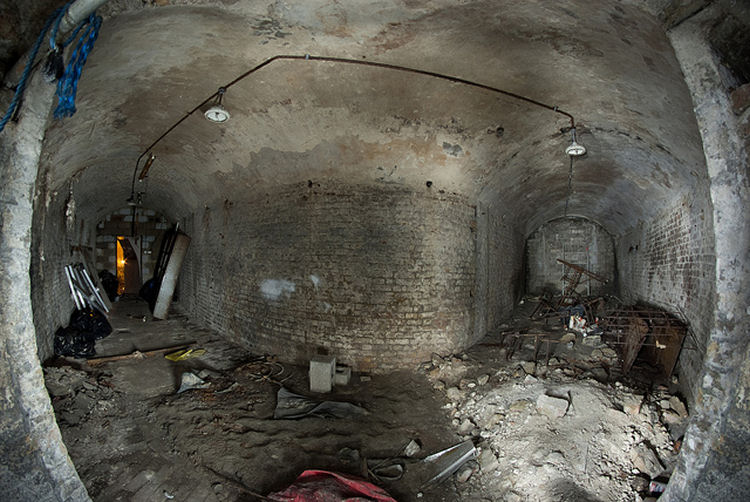
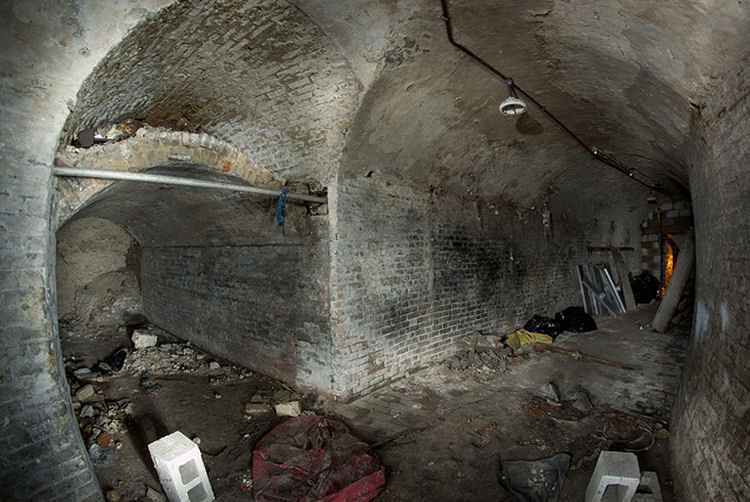
Above photo by Paul Isles showing the tunnels mentioned above.
|
|
From an email 20 August 2012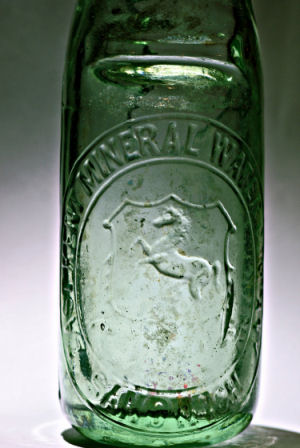
Hi Paul.
I don't know if this could clear up one of your un-answered questions
but I
found a bottle marked "East Kent Mineral Water Company LTD." in the
Cliff Brewery Vault
at Archcliff last December. Here's a photo of it. Regards. Stuart Kinnon. |
 From Bagshaw Directory 1847 From Bagshaw Directory 1847
|




